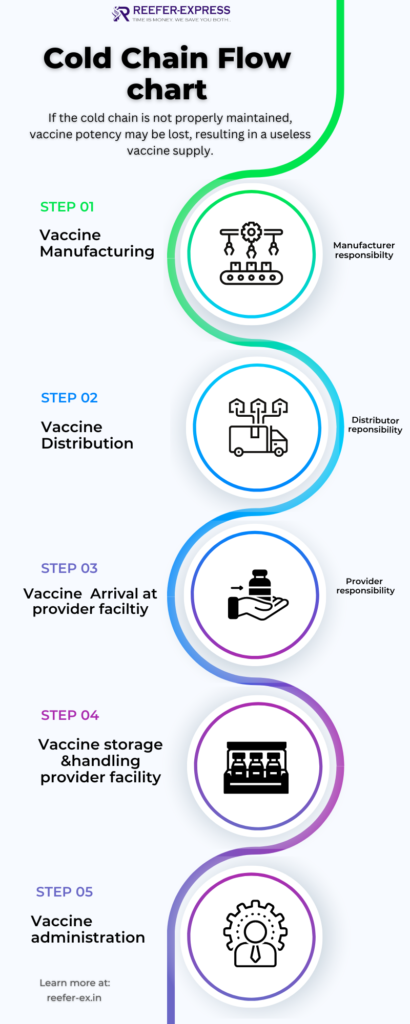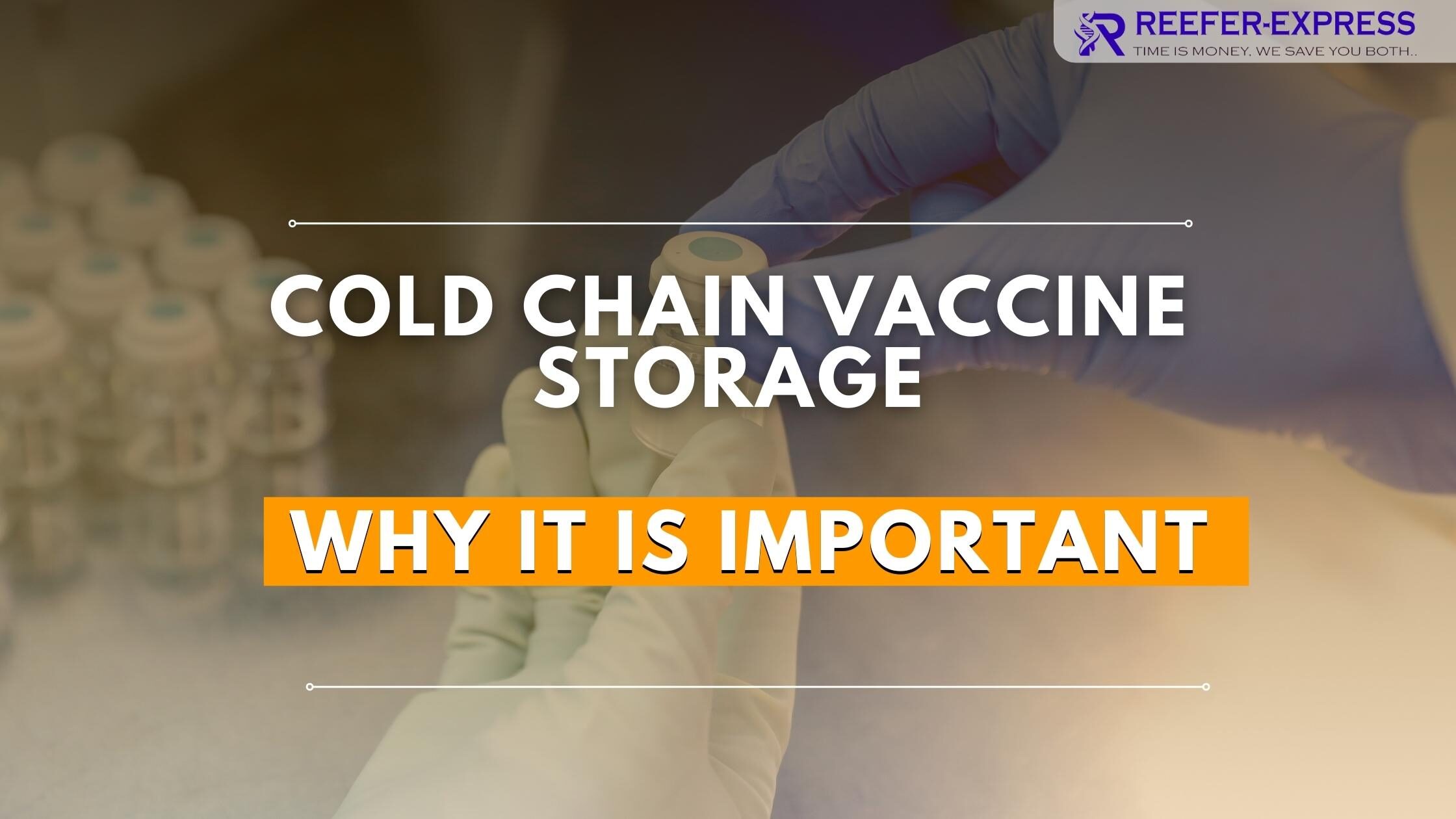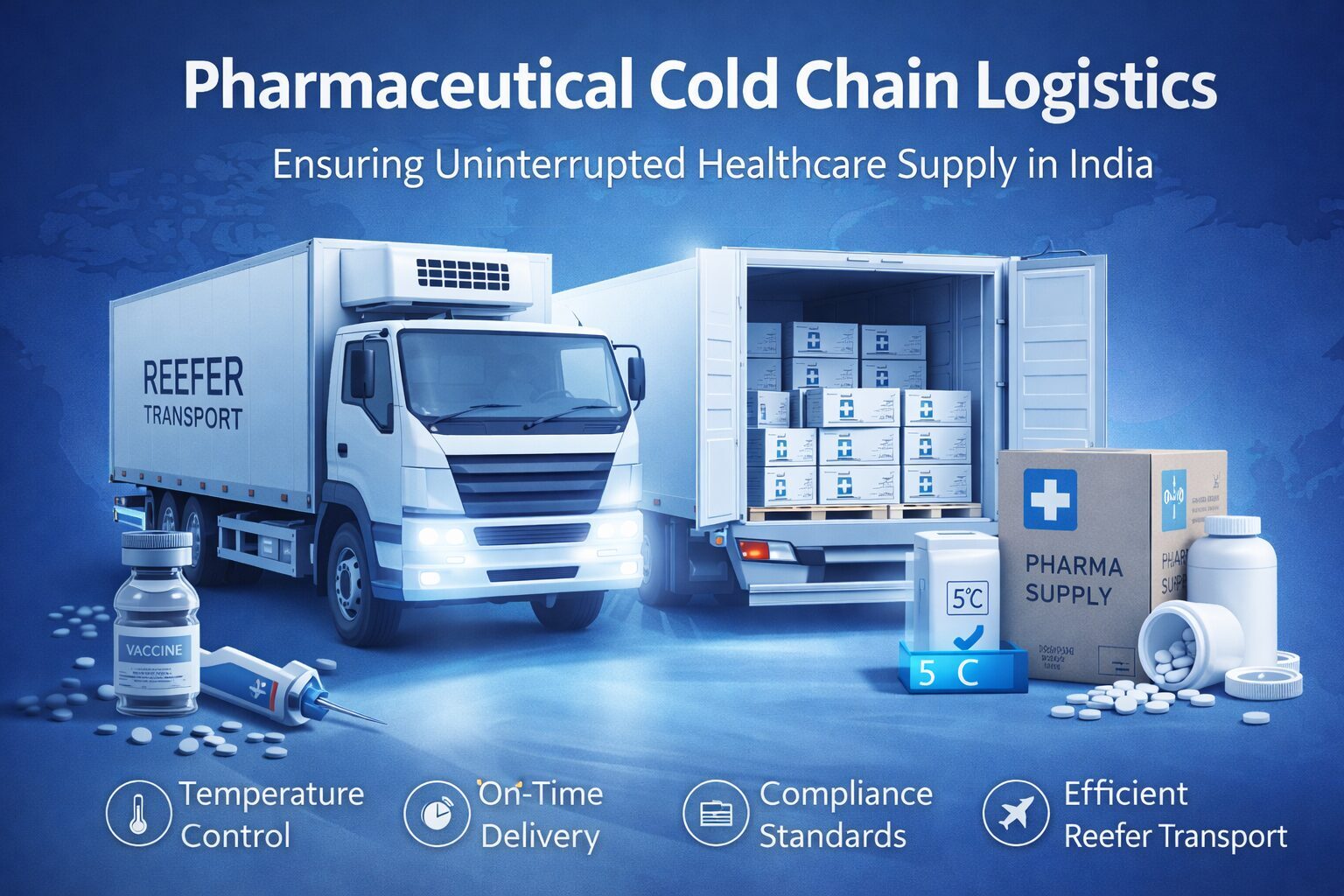The vaccine cold chain is a temperature-controlled supply chain that maintains the efficacy of vaccines and other temperature-sensitive medical products. The cold chain begins at the point of manufacture and continues through shipping, handling, and storage to administration. An uninterrupted cold chain is essential to ensure that vaccines remain potent from the time of manufacture until they are administered to patients.
Cold Chain Vaccine Storage
Cold chain vaccine storage is a system of storing vaccines at frigid temperatures, usually between 2°C and 8°C. Vaccines are delicate biological products that can be easily damaged by heat or light. They must be kept cold to maintain their potency and effectiveness.
Vaccines are typically shipped and stored in special insulated containers called cold chain boxes or box liners. These boxes keep the vaccines cold for a period of time, usually 24-48 hours. After that, the vaccines must be used or transferred to another cold storage unit, such as a refrigerator or freezer.

Importance of Cold Chain In Vaccine Storage
The cold chain is a system of handling, storing, and transporting vaccines and other temperature-sensitive biological products such as blood components, cells, and tissues. It is essential to maintain the efficacy of these products. The cold chain begins at the point of manufacture and continues through distribution to the end user.
There are many links in the cold chain, and each link must be maintained within a certain cold chain temperature range. If any link in the chain is not properly maintained, it can break the cold chain and render the vaccines or other products ineffective.
Vaccine Storage and Cold chain Management
Vaccine storage is a complex and critical component of any cold chain immunization program. Effective vaccine storage and cold chain system are essential to ensuring that vaccines are properly stored and maintained at the correct temperature throughout the distribution chain, from manufacture to administration.
Practical vaccine storage and cold chain immunization system includes:
- Adequate refrigeration and freezing capacity
- Sufficient numbers of trained staff
- Proper maintenance and calibration of temperature-monitoring devices
- Regular monitoring of vaccine storage conditions
- Standard operating procedures for handling, storing and transporting vaccines
- Contingency plans for power outages and other emergencies
Cold chain logistics is the process of managing the transportation and storage of temperature-sensitive products, such as vaccines, pharmaceuticals, and food. Cold chain logistics typically involve the use of refrigerated trucks, storage warehouses, and temperature-controlled shipping containers.
A well-functioning cold chain system is essential for ensuring that vaccines remain potent and effective throughout the distribution process. Cold chain logistics can be complex and costly, but proper planning and management can help ensure the success of any immunization program.
Vaccine Storage and Temperature Monitoring Equipments
Monitor the temperature of vaccines regularly, and transfer them to another cold storage unit if the temperature exceeds the recommended range. Keep a record of all vaccines that are stored and transported, as well as the temperatures they were exposed to.
There are a variety of equipment available to store vaccines at cold temperatures. These include:
- Refrigerators: can be used to store vaccines for short periods of time, usually up to 2 weeks.
- Freezers: can be used to store vaccines for long periods of time, usually up to 1 year.
- Thermal shipping containers: can be used to transport vaccines for short or long distances.
- Temperature monitoring devices: can be used to monitor the temperature of vaccines during storage and transport.
Vaccine Inventory Management
It is important to keep track of the vaccines that are in stock, as well as those that have been used. This helps to ensure that all vaccines are used within their expiration date and that no vaccine is wasted.
Here are a few tips for managing your vaccine inventory:
- Keep a record of all vaccines that are received and used. This can be done using a software system, or by maintaining paper records.
- Check the expiration dates of all vaccines on a regular basis, and discard any that have expired.
- Regularly review your vaccine inventory to ensure that you have enough of each vaccine in stock.
- Order vaccines well in advance of when they are needed, as it can take several weeks for them to be delivered.
- Store unused vaccines in a secure, temperature-controlled storage unit.
Things To Keep In Mind While Vaccine Storage
Vaccines are delicate biological products that must be stored at very cold temperatures to maintain their potency and effectiveness.
Here are a few things to keep in mind while storing vaccines:
- Vaccines should be stored in their original packaging, in a cool, dry place.
- If possible, store vaccines in a refrigerator or freezer that is dedicated to vaccine storage only.
- Vaccines should never be stored in a standard kitchen refrigerator or freezer.
- Monitor the temperature of vaccines regularly, and transfer them to another cold storage unit if the temperature exceeds the recommended range.
- Keep a record of all vaccines that are stored and transported, as well as the temperatures they were exposed to.
- Use only refrigerators, freezers, and thermal shipping containers that are specifically designed for vaccine storage.
- Do not use household freezers or ice chests for vaccine storage.
- Do not store vaccines in the door of a refrigerator or freezer, as this is typically the warmest part of the unit.
- In the event of a power outage, keep vaccines in their cold storage unit for as long as possible. If the power is out for more than 4 hours, transfer vaccines to a cooler with ice packs. Do not put ice directly on top of the vaccines.
- Never use a microwave oven or other heating device to thaw vaccines. Doing so can damage the vaccine and make it less effective.
- Most vaccine storage units are equipped with alarms that sound if the temperature inside rises above or falls below the acceptable range. This helps to ensure that vaccines are not damaged by heat or cold.
- Vaccine storage units must be regularly monitored and maintained to ensure that they are working properly. This includes checking the temperature inside the unit and the power supply and battery backup.
- Regular maintenance of vaccine storage units is essential to ensuring that vaccines remain potent and effective. Damaged or expired vaccines can cause serious health problems, including death.
Conclusion
Vaccines are a vital part of protecting the population from deadly diseases. It is important to store and transport them correctly to ensure that they remain effective. Cold chain storage and transportation are essential for keeping vaccines full-bodied and effective. Vaccines must be stored at very cold temperatures, and they should never be exposed to heat or sunlight.
Cold Chain Vaccine Storage solution by Reefer Express
Reefer Express is a leading provider of cold chain vaccine storage solutions. We offer a complete range of products and services to meet the needs of the vaccine industry, from ultra-low temperature freezers to refrigerated shipping containers. Our team of experts has a wealth of experience in managing the supply chains of vaccines and other temperature-sensitive products, and we are committed to providing the highest level of quality and service to our customers.






